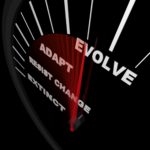When a race to provide digital technology solutions to track and trace the movement of every individual across nations intensifies, it is time we evaluate whether we want to give authority to others to control our whereabouts and activity through cyberspace.
COVID-19 Pandemic
The human ecosystem is not in balance. Humans and microorganisms have always had a complicated relationship. Many of these microbes live in symbiosis with us, and many have always been a danger. Our relationships with viruses are no different; in fact, much of our human genome comes from viruses. Every time a virus infects us, it can have evolutionary implications for humans. This pandemic will also likely evolve us as a species. So how we approach this pandemic makes a huge difference.
Pandemics often emerge during or after wars. The reason behind this is factors such as the mass movement of people, how we interact with the environment, and also profound shifts in human physiology due to enormous levels of stress during wars. So, while we all are rightfully concerned about nations’ preparedness, perhaps some more critical questions are:
- Why did we have a pandemic now?
- Beyond a lack of immunity, has there been a shift in human physiology to allow the novel coronavirus to ravage so many of us?
It is crucial that we focus on this for the future of humanity. If we do not understand the imbalances that have brought us this pandemic, we will be facing many more outbreaks, many more pandemics in the coming years.
Our Priorities
What is frustratingly clear is that we are not prioritizing the critical security risks facing humanity. It is not that we are not aware of what risks are coming our way, but we are not putting our resources into preventing those risks.
For instance, this COVID 19 pandemic. Despite emerging tools and technologies on hand like AI, IoT, and biosensor technologies, many nations struggled to identify the emergence of an outbreak in real-time. Similarly, despite us being aware of the dual-use nature of emerging technologies, we have allowed ourselves to slowly but certainly sleepwalk into a surveillance society.
Digital Surveillance
Digital surveillance has become a reality without us, even realizing that we are being continuously monitored. When a health crisis such as COVID-19 forces us to consider numerous digital tracing initiatives to stop the spread of the virus, the question becomes how to balance the use of technology with protecting our rights.
The making of cyberspace brought on many of the surveillance changes and challenges of today. The growing trends in human and machine interaction through cyberspace, the exploding digital data of digital humans, and the resulting information and intelligence are undoubtedly changing the very face of humanity. But, the lack of understanding of how each of these interactions is driving the surveillance age, bringing an enormous intrusion to our lives, is also becoming a cause of great concern.
The Emerging COVID-19 Pandemic Surveillance
In the name of controlling the spread of COVID-19, there is a race to provide many technological solutions — digital applications to track and trace the movement of every individual across nations. In the sudden shift to remote living, digital tools to monitor health, benefits, education, and governance are emerging rapidly as well. There is growing concern that these different aspects of the nation are quickly overreaching in their tracking of our movements.
At the core of the growing concern is a threat to our individual, personal autonomy. In our society, there is a fundamental focus on personal liberty. We have the capacity to be one’s own person, to live our lives according to reasons and motives that are our own. We believe in our fundamental freedom and resist with full force any action or initiative that is manipulative or an attempt to diminish our fundamental rights to autonomy.
But let me be clear: whether we live in a democratic society or under an authoritarian regime, cyberspace has single-handedly taken away a substantial amount of autonomy from every one of us. Autonomy gives us the ability to appreciate the difference between right and wrong and also allows our capability to make mistakes and recover from them. While most of our mistakes may remain private, we have a system in place to punish those whose mistakes or intentional actions impact others. However, in cyberspace, nothing is private. The making of cyberspace has fundamentally taken away our privacy and is on its way to taking away our autonomy as well.
So, At-Risk Is Our Right To Autonomy
This has been accelerated due to the current pandemic. Many governments have turned to digital tracking tools in order to protect the well-being of the public. Still, there is a need to take pause and evaluate the broader implications, especially for when the pandemic has ended.
- Do we want to give authority to others to control our whereabouts and activity through cyberspace?
Now, there is no doubt that not all of us make informed decisions all the time. Our human decision-making process is highly subjective and flawed. But it is a problem if we live under a paternalism that assumes inaccuracy on us.
The Controlling Power of Cyberspace
One blessing of cyberspace has been the democratization of innovation, and many innovators can come up with innovations trying to help different global problems. But, our autonomy needs to be an intrinsic feature of any ecosystem we build. Cyberspace has efficiently intruded into our lives without us granting any real power to cyberspace over us.
While we strive for a form of self-government in cyberspace, the inherent challenges of the making of cyberspace have perhaps made the self-governance of cyberspace challenging. As a result, the forces of cyberspace that move us through the complex web of networks, applications, platforms, and protocols have formed a controlling power that is emerging in the form of surveillance. Since the road to sabotage goes through surveillance, our fundamental rights to autonomy, to forming our own choices, decisions, and governance structures, are slowly but surely disappearing. We are beginning to be told what to do, what to think, what to eat, what to listen to, what to like, and so on.
While we would like to govern ourselves without being subject to external influences whose power does not derive from our own authority: everything we do today is mediated through cyberspace over which we have no control. The forces from cyberspace that move us to act in a certain way do not merely affect which actions we choose to perform, but also how we construct alternatives to today’s reality.
The reality remains that surveillance technology has begun to influence us in a way that makes a mockery of our authority to determine our own actions. So, we must begin a conversation on these growing influences on our decisions, intentions, and wills.
Implications of Declining Autonomy
As the mode, nature, and number of surveillance tools grow, the distinction between democracy and authoritarianism is rapidly becoming elusive. For example, mass manipulation and brainwashing through targeted information and misinformation campaigns are already occurring and having tangible effects on our society.
And make no mistake. When autonomy becomes intermixed with personal health, public health, and general wellbeing, the conversation must become much more nuanced. If we fail to govern ourselves, the implications should be our own. But many times, especially in a pandemic, our choices have consequences for those around us.
Yet, at the same time, especially for marginalized communities around the world: if we give the responsibility for our wellbeing to others — especially governments — the repercussions can be enormous and devastating.
Before we know it, how we act, how we behave, how we talk, how we eat can be fair game to government administrations that may not always have our best interests at heart.
The Rapidly Evolving Surveillance Society
It is not only the contact tracing applications of COVID-19 that are a potential concern. There are countless encroaches on our privacy in cyberspace; however, when most of us know so little about the surveillance society and its impact on us, it is difficult to evaluate its risks and rewards and the implications for the future of humanity.
The reality is that we are all under surveillance as our movements and activities are recorded by technologies from cyberspace—or connected to cyberspace, on behalf of the organizations and governments that structure our society. This information is then further separated, sort through, and categorized and used as a basis for decisions that affect our life. Such choices concern our entitlements and access to not only benefits, work, products and services, and criminal justice, but our health and wellbeing and our movement through public and private spaces.
While there have always been different modes of surveillance, the use of emerging technologies has fundamentally redefined the meaning of surveillance. This is especially true when the new surveillance technologies are smaller and more powerful, and allow many types of information to be collected, stored, and connected together. When decision-makers have access to all this information and intelligence in real-time, the shifting mode of operations and governance needs to be evaluated for its impact on the future of our species.
While it is crucial to have an in-depth evaluation of the advances in surveillance technology and its emerging applications, it is also important to understand how the growing databases, the next generation of telecommunications, CCTV cameras, advances in biometrics, and tagging and tracking technologies are changing the very nature of society, operations, and governance.
Surveillance to Sabotage
Ultimately, many surveillance technologies initially emerged due to a desire for safety, security, welfare, health, efficiency, speed, and coordination. Still, the fact that the road to sabotage begins with surveillance is a cause of great concern.
We are already witnessing the use of some surveillance technology to limit and control our behavior or movements intentionally. Often these limitations are without our knowledge or consent. And some surveillance also has this effect without it actually intending it. As a result, it is crucial to understand the effects of surveillance technology trends and the impacts they have on our personal lives, our safety, security, and on society is crucial.
Besides, surveillance is suspicious by nature. Just look at any dystopian movie set in the future. While we are excited about the many positive benefits of these technologies that grant us broad control of our lives, the associated risks and the fundamental distrust the surveillance processes and practices create need to be better understood and evaluated as it can be easily applied to sabotage.
But another question we need to evaluate is whether there is a need for a technological solution to everything: whether it be parenting, medicine, work, crime, terrorism, or fraud. Are these technological solutions even appropriate and are there potentially other, non-technological, or less invasive answers to the problems?
It is essential to understand that none of us has voted directly for surveillance systems. They come about through drives for greater efficiency and effectiveness in the private and public sectors, including through pressure from technology corporations. It is time we begin a discussion on whether we want to live in a surveillance society—and if we do not have a choice, what controls we need to put in place for our privacy, security, and fundamental rights to autonomy.





 Road Map To Digital Transformation
Road Map To Digital Transformation